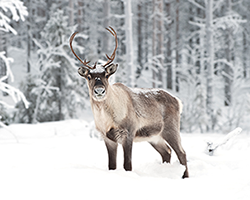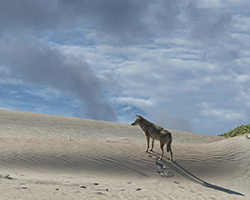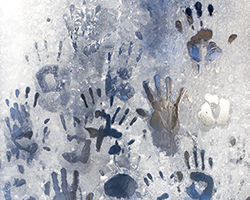Fantasy
Akiowa Finds Understanding
 The spear again pushed her forward, but Akiowa held her ground behind a large pine. “No,” she said. “I don’t want to meet them.”
The spear again pushed her forward, but Akiowa held her ground behind a large pine. “No,” she said. “I don’t want to meet them.”
For some time, torn between curiosity and dismay, she’d been covertly watching the people bustling around on the far side of the frozen river.
Curiosity, for they were surely the nomads her father had once talked of – wanderers who followed their deer herds over the bleak, snow-buried land to which the spear had brought her. Everything about them was fascinating – their furs and colourful clothes, the tents they were dismantling, the pole devices for hauling baggage they’d strapped onto their large, strange-looking deer.
Dismay, because the people were obviously unhappy. Everyone’s expression was grim, children wailed, and by a lone juniper two old women sat apart, stone-faced, as if resigned to a terrible but unavoidable fate.
Dismay had won. Akiowa felt sad enough already – troubled by the unhappiness she’d met elsewhere, distressed at being unable to help, at not understanding how to help. She couldn’t bear the weight of more misery, more failure.
“Can’t you show me happiness?” she pleaded. The spear’s reply was to send its thrill into her mouth; the Storyteller’s call burst from her.
The Armada Tree
 * Winner of the 2019 Story of the Year Award *
* Winner of the 2019 Story of the Year Award *
Long, long ago, at the time of the grievous slaughter when great oaks were hewn to build King Philip’s ships, we fell.
We were ripe and ready, our silky skins darkening to chestnut brown as we nestled in our prickly cocoon. Barely had we settled on Mother Earth when strong fingers took us up and cracked open the green wrapping that held us together. Calluses scarred the palm of a human hand as hard as father’s bark, with wrinkles and deep chasms cutting across the thickened skin.
Fingers plucked me from the soft white of my casing, tossed me in the air, and caught me. I would be his lucky chestnut, the man said to his companions, keeping him safe on his long voyage, and bringing him riches beyond imagination. Then he stuffed me inside a pouch and all was darkness, smelling of tar and tobacco and sweat.
Hidden from the life-giving sun and the kiss of the warm Spanish breeze, I could see little but the quilted lining of my sailor’s pocket, so I can only tell of my own adventures.
Akiowa Finds Love
 “… and so despite all the hardships and the tricks of the envious, the Starlight Weaver and the White Moon Hunter joined hands at the first sunset of the beginning time. And ever after they have lit the night sky, for they wish us to remember their love and happiness, and to love and be happy ourselves. So ends this story.”
“… and so despite all the hardships and the tricks of the envious, the Starlight Weaver and the White Moon Hunter joined hands at the first sunset of the beginning time. And ever after they have lit the night sky, for they wish us to remember their love and happiness, and to love and be happy ourselves. So ends this story.”
Elation filled Akiowa. The conclusion of each of the ten very different stories she’d told the villagers had brought a glorious sense of fulfillment, though the telling of them was the spear’s work, not her own. But the tales of the Starlight Weaver had always been her favourite, told and retold by her mother and aunts, however imperfectly without the spear. And this particular story spoke to her now as never before.
Love was the answer to her searching. To find love was to find happiness.
But hard on the heels of elation came fatigue, for never had the spear crammed her mind and mouth with so many stories, one after the other. Yet the villagers were already calling out with more tales they wanted telling. She would have to continue.
The spear clearly disagreed, for it moved in her hand, pulling itself from the ground. “So ends this Storytelling,” it said through her. “For now,” she added, since the children sitting close by huffed and moaned with disappointment.
Akiowa Finds Belief
 Akiowa stopped well short of the village, expecting the spear to give her the Storyteller’s call, but it urged her further forward. She stopped again at the well-tended fields of beans and maize, then at the nearest dwelling. Still the spear pushed her on.
Akiowa stopped well short of the village, expecting the spear to give her the Storyteller’s call, but it urged her further forward. She stopped again at the well-tended fields of beans and maize, then at the nearest dwelling. Still the spear pushed her on.
The village seemed deserted save for sleeping dogs— no one weaving or making new bows, no children playing, no old folk gossiping in the evening shadows.
Then she found the villagers—fewer than she’d expected—standing before a staff of painted wood. Their totem, she guessed. But if this was a festival, where were the drums, the dancers? Arms outstretched, the villagers didn’t speak, didn’t move. Yet whatever else was missing, joy was clearly present—it shone on their rapt faces.
A strong, warm voice sounded: “Thank you, Earthmaker.”
As the villagers let their arms drop, the spear sent its thrill into Akiowa. She gave the Storyteller’s call.
People started in surprise, but save for a few excited children, who were rapidly called back, no one moved until a tall, handsome man stepped out. Not the headman, for that was surely the old man dressed in lionskins standing behind him. The shaman? But he wore no spirit necklace, and would even a shaman dare take the headman’s place in welcoming her?
“Greetings, Storyteller,” said the man. “I am Pawau, priest to the Believers. We are close to completing our worship. Join us, then we shall eat together and end the day with your stories.”
Akiowa Finds Pleasure
 Akiowa gave a sigh, part relief, part longing.
Akiowa gave a sigh, part relief, part longing.
The spear had kept her in the mountains since leaving the miners, and she’d yearned to see – and walk on – something more pleasurable than deep snow and bare rock. Now at last she was overlooking a lush valley full of chokecherry, black plum and mulberry trees, much like the lands of her own tribe.
There, also, a village like her own: a scattering of earth lodges and rows of squash and beans. Some women worked – tending cooking pots, grinding grain – but most villagers sat in groups, talking. Laughter reached her.
Wistfulness enveloped Akiowa. How contented they looked. How happy. But then, the miners had seemed happy.
“Have they found happiness?” she whispered.
The spear gave no answer, but guided her down towards the village. Her heart lifted as she walked through woods glowing with autumn tints, though dismay grew at the lack of fruit on the trees – even the bitter chokecherries were stripped bare. Fruits were valuable food, but were far more valuable to the birds and beasts who shared the land. Only at a time of great need would her mother have allowed all to be picked.
A Tavern Tale
 There were a hundred men in the tavern, but you could have heard a pin drop if it weren’t for the sound of one-eyed Angsfarn, the best ratter hound in the bay, who was lying on Karl’s table, munching his way through a whole bowl of nuts.
There were a hundred men in the tavern, but you could have heard a pin drop if it weren’t for the sound of one-eyed Angsfarn, the best ratter hound in the bay, who was lying on Karl’s table, munching his way through a whole bowl of nuts.
“Well? What happened next?” Theodulf asked. The greybeard had barely touched a drop of his mead. His horn would get dusty if he didn’t move soon.
Karl kept them waiting a moment longer, just to let the anticipation build. “I’d like to say I stood my ground and slew it there and then. You all know I’m no coward, but given a choice between fighting a monster like that and surviving, I’d sooner flee and live to fight another day.”
Little Ongar squealed with excitement, and his mother hushed him.
Karl drained the dregs from his tankard and held it out for the wench to refill, again. “I slipped through a narrow doorway, certain a beast big as an ox wouldn’t be able to follow. But it was sinuous, as silent as an owl, and as fleet as a falcon. I never got more than a few feet away from the great hairy beast.”
He sighed and stared into his tankard, beery reflection gazing back at him. “I glanced back and saw its soulless eyes staring at me. Filled with hate they were, and numbered more than I could count.”
Akiowa Finds Freedom
 I am free, I am happy. I am free, I am happy.
I am free, I am happy. I am free, I am happy.
Akiowa repeated the words over and over as she walked along the ravine floor. She’d fallen into the habit to stop herself fretting about what being the Storyteller would mean – how could she live another person’s life? But a small treacherous voice wondered if it was also to convince herself it was entirely true.
Free she certainly was. Five days had passed since the old Storyteller had died; five days in which Akiowa had walked the land guided by the spear, meeting no one, free as any cottontail or prairie dog. Surely the very definition of happiness after years of slavery.
“I am free! I am happy!” she called. The rock walls threw back the words, but though “free” echoed joyfully, “happy” returned in mournful tones.
At the ravine’s end, a pool shone like a silver mirror. Akiowa set the spear down, took a breath to steady herself, then knelt to drink. The old woman’s face reflected in the water still upset her, but she no longer jerked away in horrified confusion. Only in the first moments of waking, when she saw gnarled hands and wrinkled skin, did the terror and shock of the transformation overwhelm her again.
The Storyteller Finds Akiowa
 “Old story, new story; tall story, true story…”
“Old story, new story; tall story, true story…”
The words echoed around the canyon, piercing as an eagle’s cry, thrilling as a coyote’s call. Akiowa’s heart leapt. The Storyteller!
Hands trembling with excitement, she hurried to round up the goats, hoping to pen them quickly so she could rush down to the village in time to sit close to the spear. Once, when she was small, in the happier times before she was seized by the tribeless men and sold to slavers, she’d sat with her father only an arm’s length from the spear. Magic had purled from it as the Storyteller wove her tales. Magic that glittered like sparks from a fire, but fell as soft as snowflakes on her skin, with scents of honey and woodsmoke, earth and stream. Oh, to be so close again.
But the goats refused to come at her call, and her broken leg had mended badly, slowing her further. By the time she’d herded the flock into their pen and fastened the gate, then limped her way to the village, the whole tribe was gathered before the headman’s tent, abuzz with expectation. No room near the spear, where the headman, clothed in mountain lion skins, sat with his shaman wife in her cloak of condor feathers, smouldering bark cloying the air around them. No room anywhere save at the edge of the crowd, and three times Akiowa was pushed away before she found a place she was allowed to sit.
Shifting Sand Dunes
 The coastal road between Southport and Ainsdale is edged by sand dunes, covered in long rough grasses that look like hair. Cars rush past at sixty miles an hour, headlights glaring, stereos blaring.
The coastal road between Southport and Ainsdale is edged by sand dunes, covered in long rough grasses that look like hair. Cars rush past at sixty miles an hour, headlights glaring, stereos blaring.
I walk home on the seaward side of the road, traversing the dunes as clocks tick past midnight. It feels like I am walking on the spine of a massive sleeping dog that’s waiting out the years until humanity disappears.
The journey is long, and I’m wearing a short black dress and denim jacket – more suitable for dancing than walking in below-zero temperatures. I really should’ve waited for a cab instead of thinking I could get home on foot. This route was not meant for pedestrians. I blame the wine I drank and the water I didn’t. At least I chose flat shoes over heels.
Aside from the cold, I like walking under this black-gold sky. I get caught up watching the stars instead of where I’m going. I’ve never seen anyone on this side of the coast road before, and I begin to wonder why.
Then the ground starts moving.
The Glass-Eyed Girl
 * Winner of the 2018 Story of the Year Award *
* Winner of the 2018 Story of the Year Award *
When was your first? That is always what we ask one another. When and what? When in your life was that moment, the time that revealed the world to you and sent you scurrying under the bed sheets? When I think back, the thing I always remember is the house. Not the inside, where the shadows gathered and hid. Those memories came later. I remember the front, the black and white Tudor facade with roses growing around the door, and the crunch of a gravel driveway under car tyres. God only knows how my father afforded such a place, although I suspect the Devil might have a better idea. Not a grand house, but beautiful and caught in my memory in a moment of eternal summer. Memory can be an ironic little bastard when it wants to be.
We moved there when I was about eight. I don’t remember much before that, which is odd as eight is old enough. I know some people who claim to have memories of their time as babies, of flashes of food upon their tongue, the smile of a mother’s face. I don’t have any of that. Mother never really smiled much in any case; she never seemed up to the challenge. Father laughed all the time, a laugh which echoed around that house and bounced from basement to rafter. The days there were full of laughter, though I didn’t join in.
My room overlooked the garden, such as it was, fenced in on all sides by the encroaching houses of modernity. I liked to watch the moon shining on that small patch of grass. But soon I couldn’t see out the window. There were too many handprints on it. Father got very angry about those. He said I was being naughty, that I shouldn’t make such a mess, and didn’t I know how much it cost to clean windows? Then he would laugh and raise his fist. I said nothing, through the tears. I hadn’t touched the glass. The hands had just appeared.